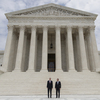
[ad_1]

A demonstrator holds an indication saying “PROTECT VOTER RIGHTS!” at a 2021 rally in Washington, D.C., calling for Congress to go new voting rights laws.
Alex Wong/Getty Images
disguise caption
toggle caption
Alex Wong/Getty Images

A demonstrator holds an indication saying “PROTECT VOTER RIGHTS!” at a 2021 rally in Washington, D.C., calling for Congress to go new voting rights laws.
Alex Wong/Getty Images
An unexpected ruling this month by the U.S. Supreme Court has saved in place a key part of the Voting Rights Act.
But the authorized battle over this landmark regulation is much from over.
The excessive court docket discovered the congressional map it allowed Alabama to make use of for final 12 months’s midterm elections doubtless violated Section 2 of the Voting Rights Act by minimizing the facility of Black voters.
Alabama’s GOP-controlled legislature is now anticipated to give you a brand new redistricting plan by July 21, and challenges to voting districts in other states are additionally set to maneuver forward, probably reshaping the political panorama throughout a lot of the South.
While voting rights advocates and lots of authorized students welcomed the ruling, they’re additionally bracing for extra challenges that might make it tougher to guard voters of coloration throughout the nation from racial discrimination within the election course of.
The Supreme Court’s Alabama ruling hints at potential subsequent fights
An uncommon group of justices — together with Chief Justice John Roberts and Justice Brett Kavanaugh, each conservative, and the court docket’s three liberal justices — shaped the slim 5-4 majority that upheld the Supreme Court’s previous rulings on Section 2 of the Voting Rights Act.
A detailed learn of their opinion for the Alabama case generally known as Allen v. Milligan, nevertheless, reveals cracks within the coalition that might result in Section 2’s demise, says Spencer Overton, a professor at George Washington University Law School, who served within the Justice Department in the course of the Obama administration.
“We’re just a vote away,” warns Overton, pointing to Roberts and Kavanaugh not joining a section of the majority opinion that talks about how a lot of a task race ought to play within the redistricting course of.
“This notion of backing away from that one section might be giving themselves room in future opinions to go a different way,” Overton provides.
Kavanaugh additionally wrote a concurring opinion that highlights an argument by Justice Clarence Thomas that underneath the Constitution, Congress can not enable race-based redistricting to go on with none cut-off dates.
“But Alabama did not raise that temporal argument in this Court,” Kavanaugh famous, “and I therefore would not consider it at this time.”
To Luis Fuentes-Rohwer, a professor at Indiana University Maurer School of Law who has written about the decline of the Voting Rights Act, Kavanaugh is sending a sign that Alabama “didn’t raise the specific question he wanted raised about the temporal nature of Section 2 — could we do this forever?”
“That’s the way he wants the case presented to him,” Fuentes-Rohwer says. “That will happen soon enough.”
What many court docket watchers had anticipated to occur this time period was the conservative justices dealing one other blow to the Voting Rights Act, which has been present process a type of loss of life by a thousand cuts over the previous decade.
The court docket’s 2013 ruling in Shelby County v. Holder, written by Roberts, successfully removed necessities for sure states and counties with a historical past of racial discrimination to get “preclearance” approval from the Justice Department earlier than making any adjustments to election guidelines. Since then, a pair of selections — in Abbott v. Perez and Brnovich v. Democratic National Committee — have made it tougher to make use of Section 2 to problem racial discrimination within the election course of.

People wait in line outdoors the Supreme Court in Washington, D.C., in 2013 to take heed to oral arguments within the voting rights case generally known as Shelby County v. Holder.
Evan Vucci/AP
disguise caption
toggle caption
Evan Vucci/AP
But for this Alabama case, the court docket left Section 2 intact.
“There could be a genuine change of heart in terms of the importance of protecting minority voting rights,” says Overton about Roberts and Kavanaugh ruling to uphold Section 2. “Or there may be this feeling that, ‘Hey, credibility of the institution is important. We’re going to appear political if we consistently side against communities of color. And so let’s just faithfully apply precedent here and have a big ideological battle on a different day.’ “
There’s already a authorized battle over who can sue underneath Section 2
While the court docket upheld Section 2, it could quickly rule on who has a proper to sue to implement the supply.
That legal fight is brewing within the decrease courts and is anticipated to finally attain the Supreme Court after a ruling by the eighth U.S. Circuit Court of Appeals.
The redistricting case, generally known as Arkansas State Conference NAACP v. Arkansas Board of Apportionment, might in the end finish the longstanding observe of personal people and teams, who don’t signify the U.S. authorities, bringing the vast majority of Section 2 lawsuits.
“This idea that there is no private right of action flies in the face of what has been occurring over the last 40 years,” says Gilda Daniels, a professor on the University of Baltimore School of Law, who served as a deputy chief within the voting part of the Justice Department’s Civil Rights Division in the course of the Clinton and George W. Bush administrations.
For voting rights attorneys like Jacqueline De León of the Native American Rights Fund — which has been representing the Turtle Mountain Band of Chippewa Indians, the Spirit Lake Tribe and a bunch of Native American voters in a Section 2 case about North Dakota’s state legislative districts — the end result of this Arkansas case might have devastating penalties.
“The private right of action is core to the Voting Rights Act,” says De León, an enrolled member of the Isleta Pueblo. “The fact that it would be questioned shows that there are extremist approaches being taken to dismantle the Voting Rights Act.”
Is there a necessity for “race-neutral” options?
While the court docket might have left race-conscious Voting Rights Act protections underneath Section 2 standing for now, Overton of George Washington University is just not optimistic about their future, given the chief justice’s skepticism of the regulation.
As a particular assistant to the U.S. legal professional normal in the course of the Reagan administration, Roberts wrote multiple memos in opposition to the “effects test” that Congress in the end launched to Section 2 in 1982. Months after becoming a member of the excessive court docket, Roberts wrote in an opinion for a 2006 redistricting case about Latino voters in Texas: “It is a sordid business, this divvying us up by race.”
“I don’t trust that this court is going to be reliable and consistent in terms of protecting voting rights, and as a result, those who are concerned about voting rights need to diversify, not put all the eggs in one basket,” Overton says, including that “race-neutral” approaches, similar to multi-member legislative districts that may be troublesome to gerrymander, could also be wanted alongside updating the Voting Rights Act’s preclearance method that the Supreme Court struck down in Shelby County.

Evan Milligan, the lead plaintiff in Allen v. Milligan, stands outdoors the Supreme Court in 2022 after oral arguments for the Alabama redistricting case.
Patrick Semansky/AP
disguise caption
toggle caption
Patrick Semansky/AP
Evan Milligan, the lead plaintiff within the Alabama case, can be considering past lawsuits.
“This is not going to be a one-and-done thing,” says Milligan, who’s the chief director of Alabama Forward, a community of Alabama-based advocacy organizations targeted on civic engagement.
“We need to think about not only how to get federal voting rights legislation passed, but we need those things at state levels,” he provides. “We also need to be thinking about why we don’t have an amendment in our Constitution that explicitly recognizes the right of all U.S. citizens of voting age to vote and have their vote counted. Why is that not explicitly defined?”
Milligan admits these are difficult questions.
But within the battle for voting rights, he says, there are not any in a single day victories.
Edited by Benjamin Swasey
[adinserter block=”4″]
[ad_2]
Source link



